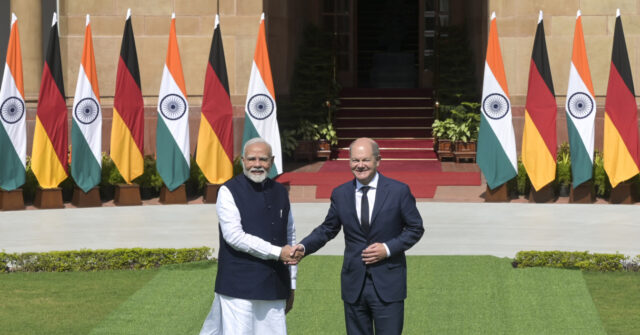In a significant diplomatic engagement, Indian Prime Minister Narendra Modi and German Chancellor Olaf Scholz convened in New Delhi to strengthen the strategic partnership between India and Germany, particularly amidst rising concerns regarding China’s expanding influence in the Asian region. Scholz’s three-day visit marks a pivotal moment, with both leaders emphasizing the importance of enhancing diplomatic, economic, and defense relations. They agreed to various bilateral agreements focused on cooperation in key sectors including defense, information technology, clean energy, skill development, and artificial intelligence, laying the foundation for a deeper strategic alliance that aligns with the international community’s shifting dynamics.
During their discussions, Chancellor Scholz reaffirmed Germany’s position as India’s primary trading partner within the European Union and expressed his commitment to elevating these economic ties further. He highlighted the necessity for an ambitious free trade agreement between India and the EU, underlining that such an agreement would be mutually beneficial. Scholz articulated a vision of a robust economic collaboration that would leverage both nations’ strengths, ultimately fostering greater trade and investment flows, which are crucial as both economies navigate post-pandemic recovery and globalization challenges.
A significant outcome of the meeting was the announcement regarding the increase in visa allocations for skilled Indian workers, with Germany raising the quota from 20,000 to 90,000. Scholz emphasized the importance of attracting skilled labor to Germany, specifically in critical sectors such as healthcare and information technology. This policy shift reflects both countries’ recognition of the value of human capital mobility and the role it plays in addressing skill shortages in Germany while providing opportunities for Indian professionals.
In the context of the ongoing conflict in Ukraine, Scholz appealed to India to leverage its influence with Russia to advocate for an end to the war. While Western allies have urged India to take a firmer stance against Russian aggression, Modi has opted for a more nuanced position, emphasizing the need for peaceful negotiations over outright condemnation of Russia. India’s historically non-aligned stance complicates its relationship with Western nations, but Modi’s calls for diplomatic solutions suggest a desire to balance its strategic partnerships.
Modi also addressed broader international governance issues, suggesting that existing global forums are inadequate for tackling contemporary challenges. He called for reforms in the United Nations Security Council, advocating for India’s inclusion as a permanent member given its status as the world’s most populous democracy. Modi’s statements reflect a growing ambition for India to play a more significant role on the world stage, particularly in shaping discussions around global security and international law, especially in regions of strategic interest like the Indo-Pacific.
As discussions unfolded, the potential for enhanced defense collaboration emerged as a vital aspect of the partnership. Although historical defense ties between Germany and India have been limited, both nations see a promising avenue for growth in this sector. Notably, Germany’s Thyssenkrupp is anticipated to collaborate with Indian firms on the construction of advanced submarines, marking a significant step towards bolstering India’s defense capabilities. This cooperation, alongside Scholz’s visit to German naval vessels participating in joint maneuvers with the Indian navy, symbolizes a growing military relationship that could reshape traditional dynamics within the region, particularly in light of China’s assertive posture.

